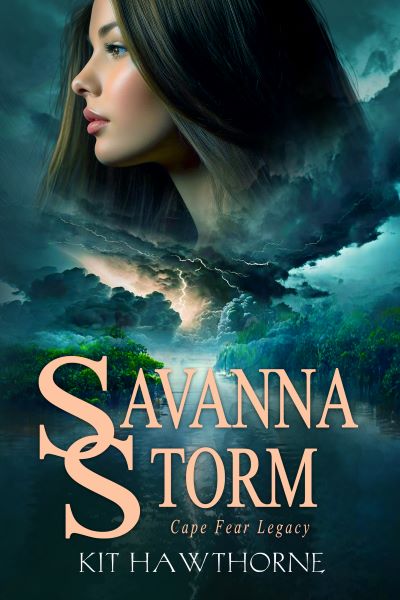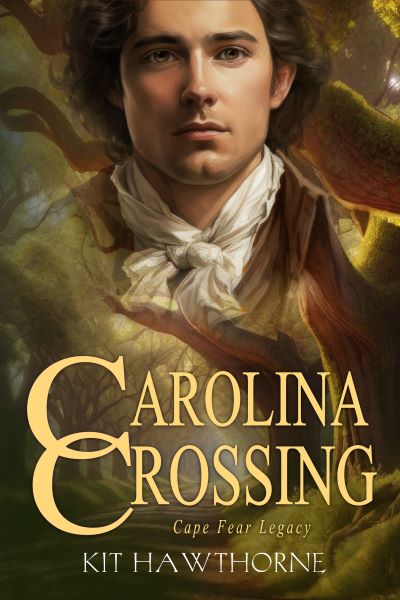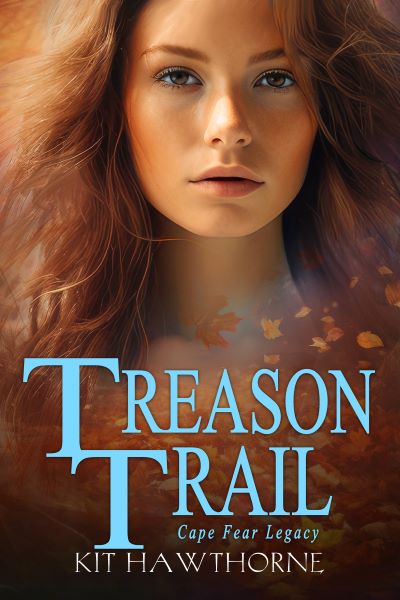The track to the tar shed was broad enough for two. Tavish tucked his hat beneath his arm, took the horse’s reins in his hand, and walked beside Catalyn.
The sun stood high above the longleaf pines, casting a thin shade on the forest floor. Light sparkled in pools of standing water left by last night’s storm. High overhead, branches curved in long hooks that dipped and rose like candelabra hung with clusters of tight green cones. Fox squirrels gnawed the cones for unripe seeds, sending dry scales pattering in a gentle shower to the needle litter. The only other sounds were the gelding’s footfalls and their own crunching steps.
Through quick sidewise glances, Catalyn pieced together a youthful profile with a short straight nose and pinched mouth. Tavish matched his pace to hers, but she sensed a thread of restless energy in the bullish set of the lowered head. One of his shoe buckles had been mended with twisted wire, and the felting at the corners of his cocked hat was frayed.
He turned to her. “Miss—Shaw, is it?”
He had a broad brow, dented with a red crease from his hat and framed by twin crescents of dark hair that had sprung free from the ribbon in back. His eyes were wide-spaced and blue—a dark, hard, steely blue like the mouth of the Cape Fear River.
“Aye, I am Miss Shaw,” she said. “Mr. Shaw is my father.”
“But the other is not your brother.”
“Alan? Nay.”
“What clan is he?”
“Colquhoun.”
“Ah,” he said grimly, as if that explained it.
The Carolina forest was as bright and open as a meadow. The lowest branches of the biggest trees hung a good twenty feet from the ground, higher than the roof of the barn at home. Berries and wildflowers thrived in the sunny space; grass and forbs grew abundantly enough for cattle to graze among the trees. The land was forest and grassland both, a pine savanna.
Today the wildflowers lay in flattened shreds, and pale scars on tree trunks marked where limbs had been shorn off.
“How did the town fare in the storm?” Catalyn asked. “Was there much damage done?”
“A sloop ran aground. It tore up the pier, and some barrels and hogsheads were lost. Dock Street is littered with roof tiles.”
“Is that all? Good. I’m glad ’twasn’t bad.”
He darted a glance at her. “I dinnae ken what ye call bad, but that was the worst storm I ever saw.”
“Nay, that was naught but a little nor’easter. A tempest is far worse—flooding, cyclones, houses and trees knocked flat. Sometimes the wind masses the water into a wall and pushes it over the shore.”
He shook his head. “Why anyone would want to live so near the sea is beyond me.”
She made an indignant sound. “The coast is a wonderful place! Sea birds keening overhead, clean salt breezes, fresh fish.”
“Ye can get fresh fish inland from rivers and lakes. If I had my way, I’d be no less than fifty miles inland and surrounded by mountains.”
“Surrounded by mountains! With the sun late to rise and early to set, and a garden not much more than sprouts, and grass so thin your stock has to rove for miles to find forage! Not to mention great hulking masses of earth and stone frowning down on you from all sides.”
“They dinnae frown! They’re friendly, friendlier than people, and old and wise.”
There was something forlorn in the words. Catalyn wondered which mountains had roused such depths of feeling in him. The Highlands of Scotland? The Carolina backcountry?
“Have ye ever been through a tempest yourself, then?” he asked her.
“Aye, in sixty-nine. The wind was so strong I could feel it through the parlor floor. My brother Rory was just a bairn. My sister Morna cried.”
“Did ye cry?”
“Nay, I was fourteen. I couldn’t cry in front of the young ones.”
She’d huddled under the heavy woollen blanket with her brothers and sisters, trying to wrap her arms around them all at once, wanting to comfort them but unable to do more than blindly cling and tremble. The shutters were closed against the lashing rain and wind, blocking whatever light might have penetrated the cloud cover. The storm tore at the walls, trying to claw its way inside. And no matter how hard she wished to keep the children safe, and Father too, she couldn’t. She couldn’t do a thing.
Then she’d heard a voice raised against the din. Peeking past the blanket’s edge, she looked through the parlor doorway and the narrow center passage and saw Father standing at the open front door, facing the storm, singing.
Our God, our help in ages past,
Our hope for years to come,
Our shelter from the stormy blast,
And our eternal home.
For a moment it had seemed that the song was stronger than the storm and that Father’s faith was a shield keeping him from harm, though she’d known well enough that brave good men could be struck down as well as craven ones.
“Some think the storm in The Tempest is based on a hurricane that hit an English fleet sailing to America,” Catalyn said. “The flagship was stranded in Bermuda for months. Father thinks Prospero’s island is based on America, too.”
“Whose island?”
“Prospero’s. In The Tempest.”
Tavish looked baffled.
“The play,” said Catalyn. “William Shakespeare?”
He shook his head. “I dinnae ken who that is.”
“Oh. Well, Shakespeare wrote plays, and The Tempest is one of them. ’Tis about a magician who conjures a storm to shipwreck some people on his island.”
“Why does he do that?”
“To bring the truth to light and punish some men who’ve wronged him.”
“Och! A storm like that one last night, ye can well believe ’twas a conjurer’s work.”
“Nay. Even a hurricane is a natural occurrence that follows natural laws. ’Tis like a top, spinning on the floor. The spinning is like the hurricane’s winds, always going round and round. But the hurricane also moves from place to place, just like the top. You cannot tell where ’twill go next or how long ’twill keep on.”
“But what starts it spinning to begin with? A giant hand? A magician’s spell?”
“Hot air in the tropics, I think.”
“Then what starts the hot air? God?”
The final syllable was hard with bitterness or fear.
Catalyn thought of the catechism. “God uses all things to work his will—”
“Uses? Or causes? Mr. Currie said the storm was God’s chastisement for the Sons of Liberty.”
“That’s absurd. He maketh his sun to rise on the evil and on the good, and sendeth rain on the just and on the unjust—aye, and tempests as well.”
Tavish didn’t answer. Perhaps he was a Loyalist, like Mr. Currie.
They walked in silence, the gelding plodding behind, until Tavish stopped short and gazed into the distance.
He pointed. “Yon’s your herd.”
His eyes must be uncommonly sharp. It took her a while to make out the shapes of the lean, rugged cattle grazing in the shaded hollows.
Catalyn counted quickly. “Hmm. Only twenty-two. Some of the calves and cows are missing. I hope they haven’t bogged down somewhere in standing water.”
“I count twenty-six. Twelve cows, twelve calves, a steer, and a bull.”
She took his word for it. “That’s the whole lot, then.”
Tavish kept his eyes on the herd as they walked past. “And they just run wild, do they?”
“More or less. They do well enough, but there are times when ’twould be good not to spend half a day searching for them.”
“Tie them to their feed troughs at night and give them some beet pulp. They’ll soon learn to come home of an evening on their own.”
They passed several huge clay-covered mounds, twelve feet high and nearly thirty feet across.
“Ye must have monstrous gophers in North Carolina,” Tavish said.
She chuckled. “Nay, those are the kilns where tar is made. You fill them with pine wood and burn it over the winter months, then pour the tar into barrels and take them to the tar shed.” She pointed to the long, low building farther ahead. “We keep pitch and turpentine there too. When we have enough to sell, my brothers take the barrels down that west track to the river shore. They lash them into a raft and float it south to Wilmington.”
Some of the barrels were sold to shipwrights in town, but most were loaded onto ships bound for England. But if tensions between England and the colonies kept building…well, surely Parliament would come to its senses soon.
Past the tar shed, the track continued northward to the carriage house, then curved eastward to the house and on to the road. The footpath Catalyn had taken to the orchard led south from the dooryard gate. From a distance Catalyn could see Dougie, the Shaws’ lanky black-and-white dog, guarding the gap the storm had made in the dooryard fence.
In the shed, Catalyn drove sticks through two tar barrels with the ends protruding, forming an axle. The sticks were hitched to the horse, one behind the other, and the barrels rolled on their own hoops.
“Clever,” Tavish said.
He put on his hat and mounted the gelding. A longleaf sapling stood close to the track, its crown as high as the top of Tavish’s head. Its branches were absurdly small for its height—a protection from fire, naturalists said. The young tree had to put all its energy on upward growth to stretch its tender tips out of reach of forest flames. It would keep on that way to a height of twenty feet or so.
This one had a tiny branch high on its trunk, with needles nearly a foot long. Leaning in the saddle, Tavish stretched out his hand, plucked off a shoot, and tucked it into his hat.
He bade Catalyn a good day and rode off, proud and graceful in the saddle, with the barrels of tar rumbling on the sandy track behind him.
Return to Savanna Storm







